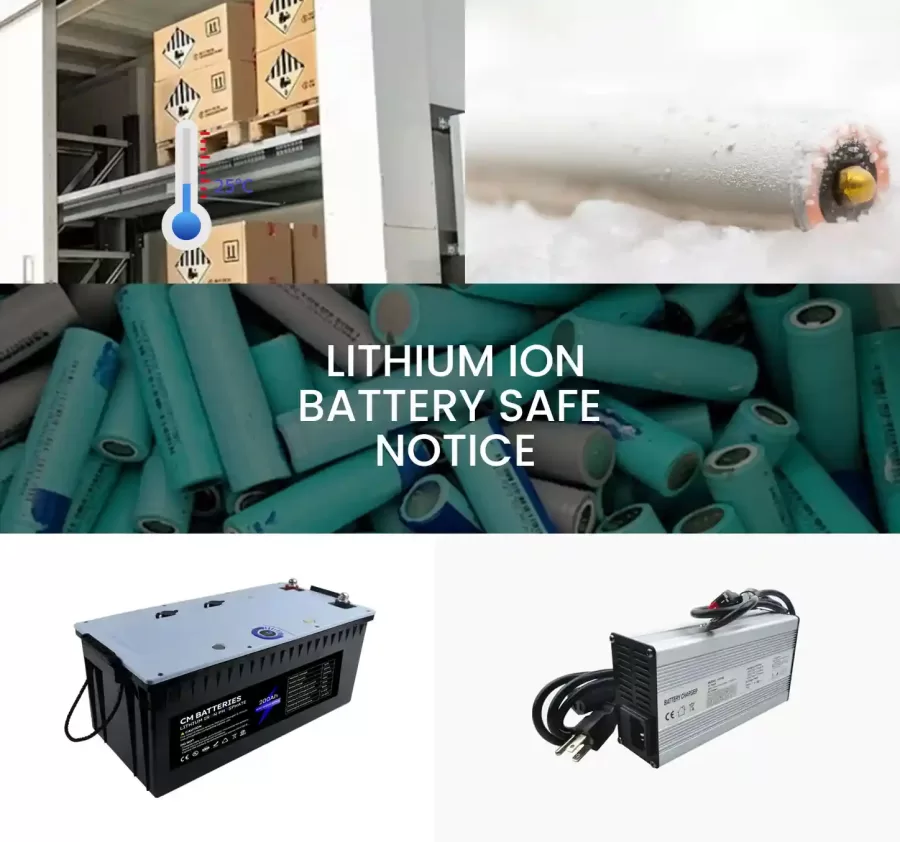Lithium-ion battery safety is a concern for users, but there are safety precautions that consumers and manufacturers of battery-operated products should be aware of. Prevent lithium-ion battery fires by following these 6 battery safety tips:
Handle With Care the Lithium Ion Battery Safety
Haphazard use of batteries can lead to dents and damage, which can increase the likelihood of fires. If you notice that a battery is dented or damaged, be sure to dispose of it properly immediately. Avoid dropping these batteries, and avoid leaving them out in the sun as well. Lithium-ion batteries need to be tended to with care.
Avoid Extreme Temperatures
According to lithium-ion battery safety regulations, keep your lithium-ion battery between 32° F and 105° F. These batteries are sensitive to temperature fluctuations, which can cause overheating, reduce battery life, or result in damage that could lead to a malfunction. For this reason, avoid storing your battery in the car or anywhere it will be exposed to direct sunlight. The same goes for humidity, which is why you should also make sure to only store your batteries in well-ventilated areas. If you require lithium-ion batteries in cold weather, look for specially designed and crafted low-temperature batteries. At the same time, choosing a high-temperature lithium battery will ensure the safety and longevity of your battery in a hot environment.

Buy From a Reputable Source
Don’t risk buying low-quality or knock-off batteries, trust me, you don’t want to meet lithium-ion battery safety concerns. Buy from a well-established, certified company to follow best safety practices.
Charge Correctly
Make sure you’re using the correct charger for your lithium-ion battery, as using an incorrect or uncertified charger can lead to overcharging. Lithium-ion battery overcharge is a dangerous situation for lithium-ion batteries, as it can create thermal runaway, where batteries get so hot that they can catch on fire. Further to this, avoid letting your battery get below a 20% charge, as this can lead to deep discharge, which reduces your battery life. Avoid these situations by using a certified charger and keeping your battery between 20% and 100% charged at all times. Make sure to never charge on a combustible surface either, as this increases the chance of starting a fire.
Dispose Properly
Do not dispose of your dead batteries yourself. Instead, take them to a certified battery recycling center. They will dispose of them properly to make sure the batteries do not start fires or lead to chemical leaks. Before you bring your used batteries to a facility, tape the battery terminals with electrical tape (any tape made of non-metallic material is acceptable, but electrical tape is preferred) to ensure safe transport. You can put each battery in its own plastic bag as well.
Be Prepared for a Fire
Have a working fire extinguisher next to your charging station, and train your staff to use it. Also ensure that everyone knows the protocol in the case of a fire, which will most likely include instantly calling 9-1-1. Lithium-ion battery fires are especially dangerous as they produce toxic emissions, so these fires need to be put out immediately and the area needs to be evacuated.
The first step in lithium-ion battery safety is concern by user is choosing the best possible battery for your product or device. CM Batteries crafts reliable and safe customized batteries for a wide array of unique applications and environments. Reach out to a CM Batteries representative today to learn more.


